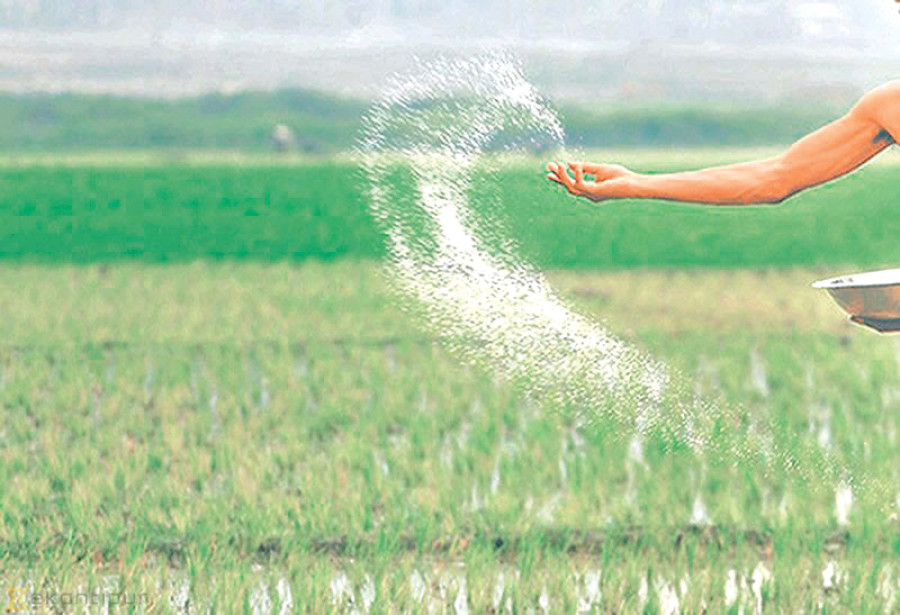Opinion
Changing things around
Focus on high-value products and commercialisation will make us agriculturally independent
Kantilata Thapa
Nepal, like many other Asian nations, has a large and growing young population, with an increasing rate of mobility. The strong urge to acquire better education and a desire to experience life in foreign lands have pushed the number of outbound young Nepalis, particularly students, to rise in the last few years. Last year alone, according to World Education Services, a record high number of nearly 44,255 students left the country. Data suggests that Nepal’s student population will grow by nearly 800,000 in the next decade, and it is no surprise that a sizable percentage of those students will apply to study abroad.
In this outflow of young Nepalis, the sector that will be most affected is agriculture. Agriculture is the primary life-sustaining activity for most of the population in the country. And it is a practice that is deeply rooted in our tradition, life, literature, religion, knowledge and philosophy. A sudden decline or shift of human resources in the sector could dramatically affect all aspects of social life and national economy. Agriculture is a rural phenomenon, and statistics show that most of the rural working age population leave the country in search of greener pastures in foreign countries. This creates a vacuum of agricultural labour that highly affects productivity. It is easy to buy a sack of rice at the corner shop, but we don’t realise how many people have worked hard to get that sack of rice to our corner shops. No sector can bring the desired level of returns in the national economy unless the youth of the country is involved in it.
Nepal’s agriculture sector is currently suffering from a human resource and agri-entrepreneurship deficit because cash attraction is pulling an increasing number of young and energetic minds from the country to the Gulf and other countries. Selling off land and cattle to arrange money for jobs in foreign land is a growing trend in the rural areas. But, tempted by the lure of the lucre, many youths of Nepal in foreign countries have sometimes become victims of injustice, insecurity, terrorism, accidents and serious health problems. If we look at the ages of migrants, we can find that in 2008, out of a total of 15 percent absentee population of the country, about 80 percent belonged to 15-44 age group, and 89 percent migrated from rural area. This shows that the working age population were migrating in outsize and most of them were from rural areas.
The reasons behind migration are almost the same in Nepal as in other parts of the world. Poverty, limited employment opportunities, deteriorating agricultural productivity and political instability are some of the motives. There are many villages in Nepal where labour migration has been established as a culture of a community. The influence of friends, relatives and well-wishers has also played a prominent role in the promotion of international labour migration. Migration is considered not only as an escape from poverty, but also a means to improve one’s living.
There are many ways this form of migration can be controlled. For an agrarian economy like ours, timely reforms in farming policies and commercialisation of agriculture are the need of the hour. Policies should aim at making agriculture a dignified profession and increase its productivity. And that is not going to happen without adequate input and investment. A proper shift in occupation composition from agriculture to non-agriculture generally shows the progress of the country. But in Nepal, it is seen that this shift is rather haphazard. We have not been able to increase the productivity of our farmers as compared to the productivity of workers in other sectors. The sector should be developed in such a way that it can transform the economy as a whole. Products like apple, tea, coffee, ginger, cardamom, cheese, fresh water fish and flowers have good export potential. With due focus on high-value products and their commercialisation, agriculture will certainly make the country more economically independent.
More and more youths need to be inspired to start investing their energy and entrepreneurship in agriculture to make the country prosperous. The Nepali government can do this by providing the youth the right motivation and opportunities, so that people can feel more dignified working in their motherland. More youths will discard the idea of going for foreign employment and join this profession if they are able to reap more lucrative returns. A boost in agricultural production is vital for attaining food security, self-reliance and import substitution which is only possible through the youth of the country.
Thapa is the Regional Exchange Coordinator at the Institute of Agriculture and Animal Science.




 9.7°C Kathmandu
9.7°C Kathmandu










